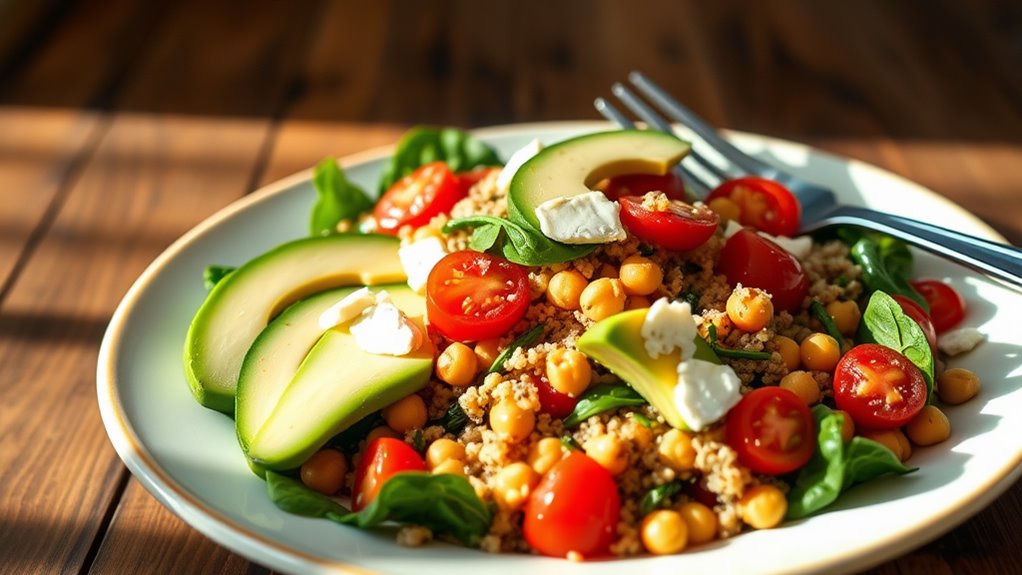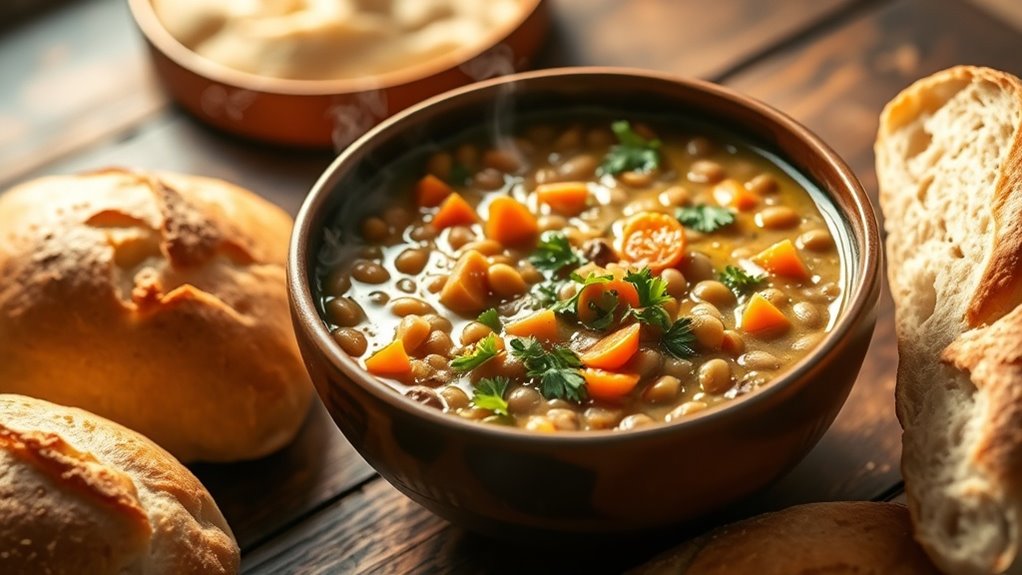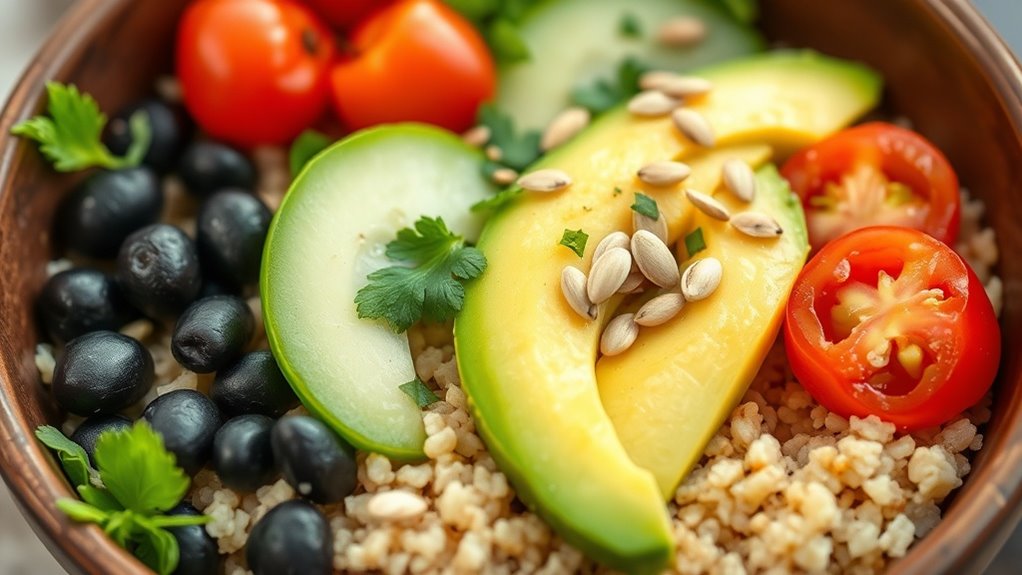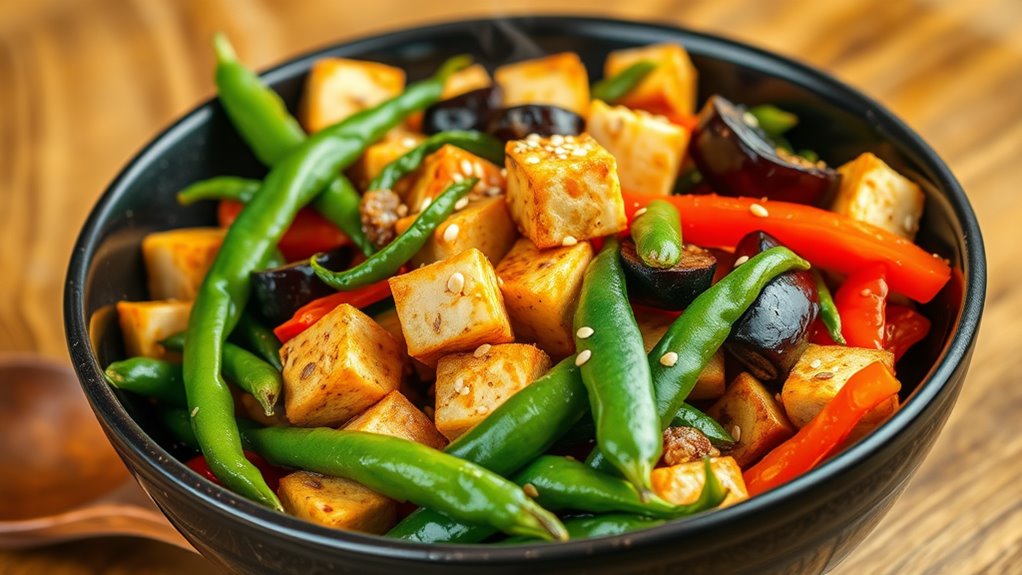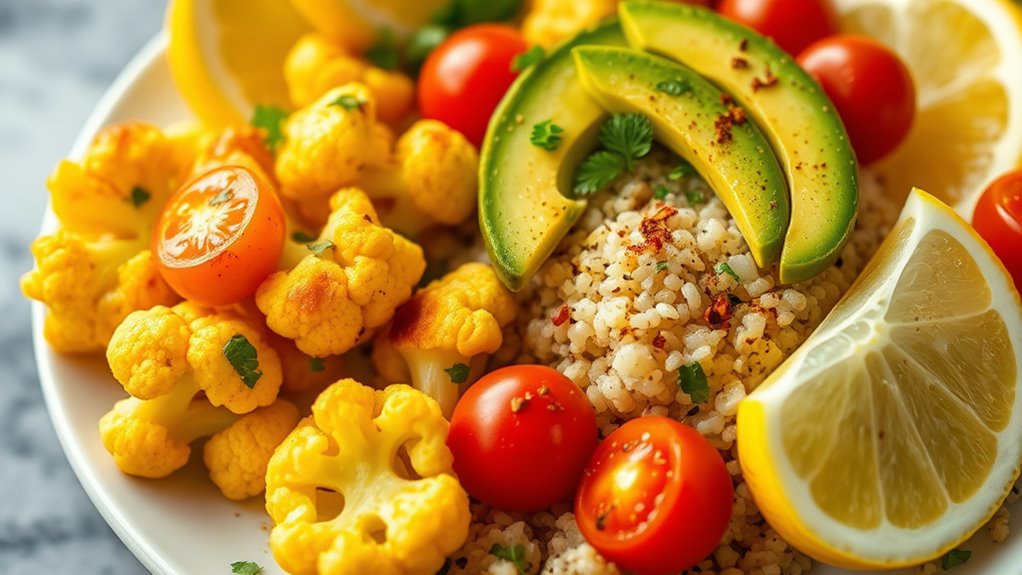Easy Vegetarian Dinner That’s Surprisingly High in Protein
Are you aware that a vegetarian dinner can be both satisfying and high in protein? Many people overlook the nutritional benefits of plant-based meals, but options like quinoa and chickpeas can deliver impressive protein levels. These ingredients not only support muscle repair and weight management but also provide vibrant flavors. If you’re curious about how to incorporate these elements into your weeknight meals, keep exploring for quick recipes and tips.
Key Takeaways
- Incorporate legumes like chickpeas or lentils for meals that provide 15-18 grams of protein per cooked cup.
- Use quinoa as a base, offering a complete protein with about 8 grams per cooked cup.
- Add tofu or tempeh to dishes; tempeh contains around 31 grams of protein per cup.
- Enhance salads or stir-fries with nuts and seeds, which contribute protein and healthy fats.
- Prepare quick recipes like chickpea salad or quinoa stir-fry in under 30 minutes for nutritious, protein-rich dinners.
Why Choose a High-Protein Vegetarian Dinner?
Why should you consider a high-protein vegetarian dinner?
Incorporating easy plant protein dinners into your meals can boost energy levels, enhance muscle repair, and support weight management. Research shows that vegetarian diets rich in protein can provide essential amino acids while reducing the risk of chronic diseases. High-protein options, like legumes, quinoa, and tofu, aren’t only nutritious but also versatile, allowing you to create satisfying meals without meat. Additionally, exploring unconventional protein sources can further diversify your diet and maximize nutritional benefits.
Key Ingredients for Protein-Packed Meals
A variety of key ingredients can elevate your vegetarian dinners, making them rich in protein and flavor.
Legumes like lentils, chickpeas, and black beans are excellent choices, providing around 15-18 grams of protein per cooked cup.
Quinoa, a complete protein, offers about 8 grams per cooked cup.
Incorporating tofu or tempeh adds substantial protein; tempeh contains about 31 grams per cup.
Don’t forget nuts and seeds, such as almonds and chia seeds, which contribute healthy fats along with protein.
Lastly, dairy or plant-based alternatives enriched with protein can enhance your meals, ensuring you meet your dietary needs without sacrificing taste. Additionally, exploring plant-based protein options can help diversify your meals and introduce new flavors.
Quick and Easy Recipes to Try
Looking for quick and easy vegetarian recipes that pack a protein punch? Here are three delicious options to try tonight!
| Recipe | Protein Source | Cooking Time |
|———————-|————————|—————-|
| Chickpea Salad | Chickpeas | 10 minutes |
| Quinoa Stir-Fry | Quinoa and Edamame | 20 minutes |
| Lentil Soup | Lentils | 30 minutes |
These meals not only deliver on protein but also offer vibrant flavors and textures. They’re perfect for busy weeknights, ensuring you stay fueled and satisfied. Incorporating incredible flavors into your vegetarian meals can make healthy eating accessible and enjoyable for everyone. Give them a go and enjoy a nutritious dinner in no time!
Tips for Boosting Protein in Your Dishes
Are you seeking effective ways to boost the protein content in your vegetarian dishes?
Start by incorporating legumes like lentils, chickpeas, and black beans, which are packed with protein and fiber.
Quinoa and farro are excellent grain choices that provide complete proteins.
Don’t forget about nuts and seeds; adding almonds or chia seeds can enhance both texture and protein levels.
Tofu and tempeh are versatile sources, too.
Lastly, consider using protein-rich dairy products like Greek yogurt or cottage cheese in your recipes.
Additionally, including plant-based proteins in your meals can significantly contribute to your daily protein intake while offering diverse flavors and textures.
Meal Prep Ideas for Busy Weeknights
How can you streamline your weeknight dinners while still enjoying nutritious vegetarian meals?
Start by prepping grains like quinoa or brown rice in batches; they store well and serve as a protein-rich base.
Chop vegetables and store them in airtight containers for quick access.
Consider making a big batch of chili or soup; they freeze well and are easily reheatable.
Incorporate legumes like lentils or chickpeas for added protein.
Lastly, assemble simple salads with mixed greens, nuts, and seeds ahead of time.
For a truly quick meal, try to focus on 30-minute dinners that transform everyday ingredients into delicious feasts.
With these meal prep strategies, you’ll enjoy healthy dinners without the stress during your busy weeknights.
Nutritional Benefits of a High-Protein Vegetarian Diet
With meal prep strategies in place, you can easily reap the nutritional benefits of a high-protein vegetarian diet. This approach not only supports muscle health but also provides essential nutrients, making it a smart choice for everyone.
-
Helps maintain healthy weight
-
Supports muscle growth and repair
-
Stabilizes blood sugar levels
-
Provides essential amino acids
-
Boosts satiety and reduces cravings
Incorporating high-protein vegetarian foods, like legumes, quinoa, and tofu, ensures you get the energy and nutrients you need while enjoying diverse and delicious meals. Additionally, exploring meatless magic in your cooking can elevate your vegetarian dishes, making them even more satisfying. Your body will thank you for making this nutritious choice!

